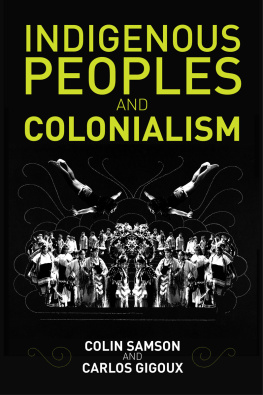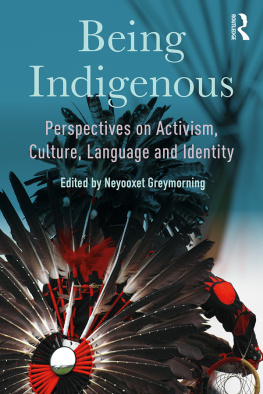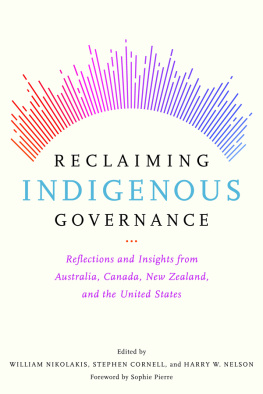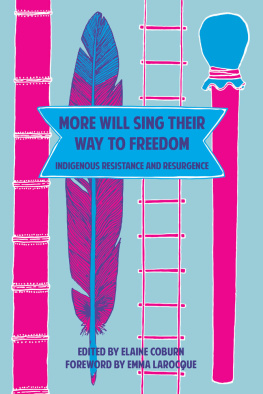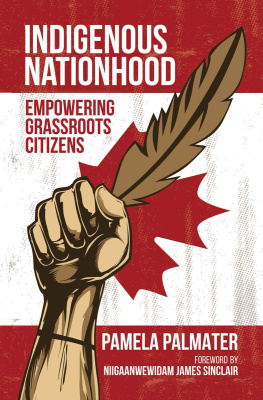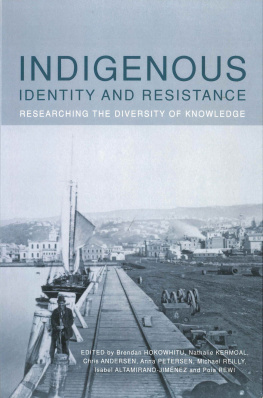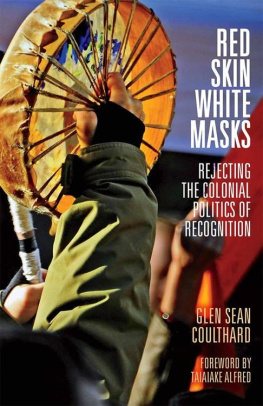Contents
Guide
Pages

Indigenous Peoples and Colonialism
Global Perspectives
Colin Samson and Carlos Gigoux
polity
Copyright Colin Samson and Carlos Gigoux 2017
The right of Colin Samson and Carlos Gigoux to be identified as Authors of this Work has been asserted in accordance with the UK Copyright, Designs and Patents Act 1988.
First published in 2017 by Polity Press
Polity Press
65 Bridge Street
Cambridge CB2 1UR, UK
Polity Press
350 Main Street
Malden, MA 02148, USA
All rights reserved. Except for the quotation of short passages for the purpose of criticism and review, no part of this publication may be reproduced, stored in a retrieval system, or transmitted, in any form or by any means, electronic, mechanical, photocopying, recording or otherwise, without the prior permission of the publisher.
ISBN-13: 9781509514571
A catalogue record for this book is available from the British Library.
Library of Congress Cataloging-in-Publication Data
Names: Samson, Colin, author. | Gigoux, Carlos, author.
Title: Indigenous peoples and colonialism : global perspectives / Colin Samson, Carlos Gigoux.
Description: Malden, MA : Polity Press, 2016. | Includes bibliographical references and index.
Identifiers: LCCN 2016013425 (print) | LCCN 2016025561 (ebook) | ISBN 9780745672519 (hardcover : alk. paper) | ISBN 0745672515 (hardcover : alk. paper) | ISBN 9780745672526 (pbk. : alk. paper) | ISBN 0745672523 (pbk. : alk. paper) | ISBN 9781509514564 (mobi) | ISBN 9781509514571 (epub)
Subjects: LCSH: Indigenous peoples--Colonization. | Indigenous peoples--Government relations. | Indigenous peoples--Ethnic identity. | Self-determination, National.
Classification: LCC JV305 .S36 2016 (print) | LCC JV305 (ebook) | DDC 323.11--dc23
LC record available at https://lccn.loc.gov/2016013425
The publisher has used its best endeavours to ensure that the URLs for external websites referred to in this book are correct and active at the time of going to press. However, the publisher has no responsibility for the websites and can make no guarantee that a site will remain live or that the content is or will remain appropriate.
Every effort has been made to trace all copyright holders, but if any have been inadvertently overlooked the publisher will be pleased to include any necessary credits in any subsequent reprint or edition.
For further information on Polity, visit our website: politybooks.com
Acknowledgements
The idea for this book is inspired by indigenous peoples continued resistance to colonialism, their enlivening worldviews and their respect for the natural world we inhabit. We are indebted to many of them for sharing with us their knowledge, hospitality and friendship. Our work is also a consequence of our collaborative research and teaching in the Department of Sociology and the Centre for Interdisciplinary Studies at the University of Essex. We are truly grateful to our students for their questions and critical comments when discussing indigenous issues.
Colin Samson I thank George Rich of Natuashish, Canada, and Napess Ashini, Marcel Ashini and Anthony Jenkinson of Sheshatshiu, Canada, for constant friendship and solidarity; Caskey Russell, Tory Fodder and the American Indian Students Alliance (University of Wyoming) for their hospitality and introductions to the indigenous worlds in Wyoming; Jennifer Hays (University of Troms) for help in Namibia; Hideo Ichihashi (Saitama University) for help in Hokkaid also Pierrot Ross Tremblay (Laurentian University), Maria Sapignoli (McGill University), Damien Short (University of London), James Wilson, Fiona Watson and Jony Mazower (Survival International), Stephen Small (University of California, Berkeley), Charles Watters (University of Sussex), Rob Schehr (Northern Arizona University) and Sarah Sandring (Nirgun Films); and Nicola Gray for support and patience.
Carlos Gigoux I would like to thank my parents Carlos and Mara Elena for their love, constant support and motivation. I am grateful to Mihoko Fukushima (University of Miyazaki) for welcoming me to Japan and for organizing the seminars that we teach on indigenous peoples and sustainable development. I would like to express my gratitude to Richard Siddle (University of Hokkaido), Jeffry Joseph Gayman (University of Hokkaido) and Jolan Hsieh (National Dong Hwa University) for their friendly welcome and for our many hours of conversations.
Warm thanks to Jonathan Skerrett for his guidance in publishing the book and to Sarah Dancy and India Darsley for their thorough editing of the manuscript.
Preface
In 2007 the United Nations adopted the Declaration on the Rights of Indigenous Peoples (UNDRIP). Its success was largely the result of the dedicated and persistent activism of indigenous social movements in the face of resolute opposition from states with indigenous populations. Although it is not legally binding, the Declaration means that the relationships between national governments and indigenous peoples can no longer be consigned to matters of domestic policy only. The demands by members of indigenous communities for designated international rights for indigenous peoples emerged from longstanding colonial occupation, dispossession and induced transformations of distinct peoples, often justified as an inevitable consequence of modernity.
Our book underlines the connections between modernity and colonialism. In particular, it focuses on colonialism as a modern and contemporary experience. We aim to contribute to an understanding of these dynamics by examining how indigenous peoples have been dealt with under European and other types of geopolitical expansion and how they continue to be treated today as their lands are targeted for settlement, agriculture, industrialization and fossil fuel extraction. The main ideology that legitimates these modern processes is Western liberalism, a body of ideas that has most often been represented as universal and emancipatory. We attempt to show how liberal ideas are applied differentially and selectively and how they often masquerade for decidedly illiberal policies and actions. Social scientific and literary writers as diverse as W.E.B. Du Bois, Frantz Fanon, Aim Csaire, Hannah Arendt, bell hooks, Vine Deloria, Edward Said, Paul Gilroy and Enrique Dussel have extended the critique of modernity into this domain. Furthermore, numerous contemporary indigenous scholars such as Linda Tuhiwai Smith, Aileen Moreton-Robinson, Pamela Palmater, Devon Mihesuah, Taiaiake Alfred, Glen Sean Coulthard, Audra Simpson, Leanne Simpson, Robert Warrior, James Fenelon, Dale Turner, Duane Champagne, Gerald Vizenor, N. Scott Momaday, Leslie Marmon Silko and scores of younger indigenous writers, academics, activists, and commentators are daily adding to the varied corpus of knowledge of the ongoing colonial aspects of modernity.
Our discipline, sociology, has not made the study of colonialism a priority. Instead, it has primarily looked at society parochially from the vantage point of nineteenth-and twentieth-century theories that argued that developments such as democracy, rationalism, the state and industrialism made the West uniquely progressive. Although sociologists have examined empires, they have largely excluded indigenous societies from modernity, and indigenous scholars, writers and orators have rarely been used as sources of authority. The omission of indigenous peoples in sociology can be explained by the fact that, although many rejected elements of the social evolutionist ideology of early social science (Kurasawa 2004), they constructed stages of human society which positioned indigenous peoples further back in history. Consequently, founding fathers such as Weber, Durkheim and Marx made the rise of Europe their main focus (Samson and Short 2006). The study of indigenous peoples was left to anthropology and various types of natural science, including the subfield of scientific racism. These academic divisions have yet to be completely transcended. Sociologists who in the past analysed colonialism and empires have been retroactively assigned to anthropology (Steinmetz 2013: 1), and sociologists such as us are often assumed to be anthropologists simply because of our interests in indigenous societies.

